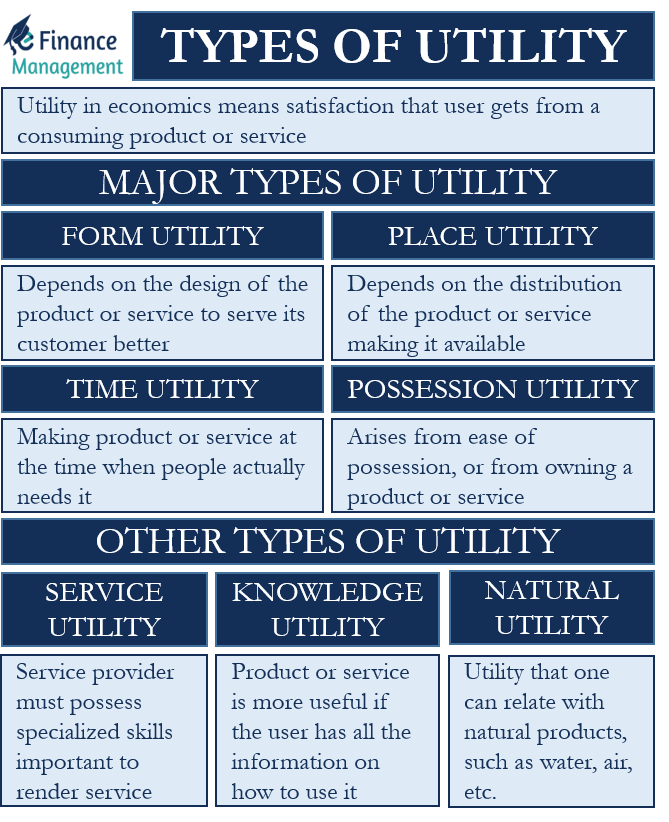Utility in economics means the satisfaction that a user gets from consuming a product or service. Different users can get varying levels of utility from the same product or service. For instance, the utility of a burger is more for a user who loves fast food than those who don’t love fast food. Additionally, the utility that a user gets also depends on a few more factors called types of utility.
The types of utility play an important role in a user’s buying decision. Thus, for a business, it is very important to understand these types of utility. It would allow businesses to serve their customers better and, in turn, boost their revenues.
Types of Utility
Primarily there are four types of utility: form utility, place utility, time utility, and possession utility. Let’s take a look at each of the four kinds of utility in detail:
Form Utility
This utility depends on the design of the product or service. The closer a product or service is to what the user wants, the more utility a user will get from it. Or, we can say that businesses will be able to serve their clients better by making their products or service in line with the requirements of the buyer.
For example, Company A sells DIY furniture. Basically, Company A sells all things that a user needs to make their everyday furniture easily. In a consumer survey, however, the company found that though some customers found the products to be fun, many complained that they would prefer getting assembled products rather than DIY. So, the company changed its manufacturing process to make both types of products. This way, Company A was able to increase its sales.
Place Utility
The more easily a good or service is made available to potential customers, the more utility it will offer. Thus, businesses can raise the utility by providing easy access to the customers of their product or service. This utility mainly depends on the distribution of the product or service, such as making it available at nearby stores or on online platforms.
Apple is a very good example of explaining this utility. The company sells its products online, through its own stores, as well as through third-party stores, such as Best Buy.
Time Utility
This utility basically means if a product or service is available to the user when they actually need it. So, this utility mainly hinges on the company’s supply chain management. By focusing on processes, including logistics, storage, and delivery, businesses can quickly raise the utility of their product or service. For instance, making their products or service available 24×7 or giving same-day delivery on their product or service.
Online car rental service companies are a very good example of this. Now, we can easily and quickly book a car for rent through a mobile application. More importantly, with the use of location and map services, the cabs reach the customers fairly quickly.
Possession Utility
This utility arises from the ease of possession or from owning a commodity. Thus, it is crucial for businesses to make all efforts to make the acquisition process user-friendly. Possession utility can also arise if a product has more than one use. After-sales services also impact the possession utility. The better the after-sales service, the more utility for the customer.
For example, Company X is a car dealership that sells and leases cars. To make it easy for potential customers to own a car, the company offers easy financing. For instance, Company A provides leasing contracts to allow users to use the car by making monthly payments. Also, customers have the option to buy the car after the end of the lease.

Other Types of Utility
Apart from the above four main types of utility, there is three more utility that one should know about. These are:
Service Utility
This utility is for the service and not commodities. Such a utility means that the service provider must possess specialized knowledge and skills that are important to render the service. For instance, a chartered accountant must have financial knowledge.
Knowledge Utility
A product or service is more useful if the user has all the information on how to use it. Businesses can create this utility through advertisements, product demos, etc.
Natural Utility
This is the utility that one can relate with natural products, such as water, air, and more. All free goods have this utility, and thus, they are able to satisfy the want of users.
Final Words
It is extremely crucial for businesses to track and analyze the utility of their products. Though it may not be the decisive factor in determining the success or failure of a product or service, it does help in determining acceptability. It won’t be wrong to say that it is the need to add more utility to a product or service that pushes businesses to continue to innovate.
RELATED POSTS
- Marginal Benefit – Meaning, Importance And More
- Ordinal Utility – Meaning and Assumptions
- Theory of Demand – Meaning, Demand Curve, Exception, and Graph
- Why Must Marginal Utility be Equal to Price?
- Cardinal Utility – Meaning, Assumptions, Advantages, and Disadvantages
- Consumer Equilibrium – Meaning, Example, and Graph

